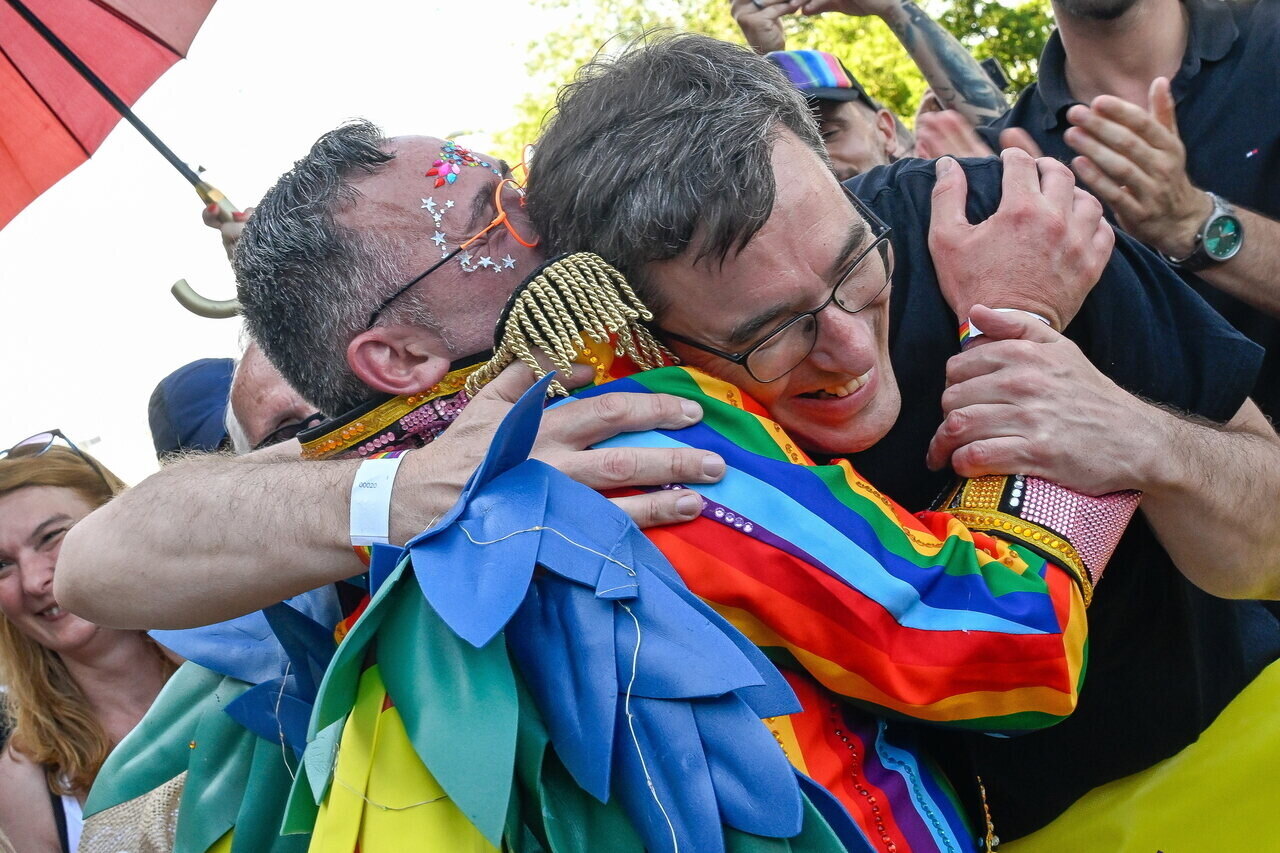Despite government ban, Budapest Pride draws record crowds — Many see it as a sign of Orbán’s imminent downfall

This year’s Budapest Pride sparked unprecedented domestic and international reactions: while tens of thousands marched for LGBTQ+ rights despite a government ban, major global media outlets framed the event as a political demonstration.
International response
As Telex reported, leading international media outlets took notice as thousands participated in Budapest Pride, defying the Hungarian government’s ban. According to Reuters, the parade evolved into a protest against Prime Minister Viktor Orbán, even as Justice Minister Bence Tuzson threatened the organisers with up to one year in prison.
Spanish daily El País and France’s Le Monde both emphasised that Budapest Pride has grown beyond a traditional LGBTQ+ rights march, becoming a symbol of fundamental human rights. Italy’s La Repubblica streamed the event live, while The New York Times and The Guardian highlighted the political undertones—pointing to weakening support for the ruling Fidesz party and mounting tensions ahead of the 2026 elections as possible motives behind the attempted ban. The BBC and CNN also covered the event, underlining Budapest Pride’s increasing international significance.

Viktor Orbán responds to Budapest Pride
According to Index, Prime Minister Viktor Orbán addressed the Pride march the following day. In a post shared in the closed Facebook group Club of Fighters, he claimed the event was held “on Brussels’ orders” and described it as an attack on Hungary’s sovereignty. He alleged that the march represented the political base of the Tisza Party, the Democratic Coalition (DK), and Budapest Mayor Gergely Karácsony.
Despite the large turnout, Orbán argued it paled in comparison to the more than three million who voted in the 2022 “gender referendum.” He called the event “repulsive and shameful,” singling out drag performances, men in high heels, and pamphlets on hormone therapy.

Other government figures echoed Orbán’s tone. Minister Gergely Gulyás claimed the opposition had “merged with the Pride,” while Budapest’s Fidesz chapter criticised Karácsony for politically and financially supporting the event. Amid rising political tensions, Budapest Pride saw a record turnout—organisers estimated up to 200,000 participants—who described the atmosphere as peaceful and celebratory. Analysts noted that the day was not solely about LGBTQ+ visibility but also reflected a reshaping of the political landscape ahead of the 2026 elections.
Péter Magyar weighs in
Péter Magyar also responded with a sharp critique of Orbán in a Facebook post. The Tisza Party leader dubbed the prime minister “Europe’s Pride King,” noting that no other figure had ever mobilised such a large protest, even partially directed at themselves.
According to Magyar, Orbán has lost his authority as prime minister and now relies solely on inciting hatred as a political strategy. He pointed out that police did not carry out political orders to ban the Pride march, suggesting cracks are emerging in the government’s power structure. In his post, Magyar compared the current situation to the final days of former Prime Minister Ferenc Gyurcsány’s tenure, citing the deteriorating state of public services such as healthcare and rail transport. He claimed that many Hungarians are now simply “counting down the days” to a change in government.
Has Viktor Orbán lost control?
According to an article by Szeretlek Magyarország, the demonstration highlighted that Budapest is politically lost to Fidesz for the foreseeable future, with signs of declining support appearing in other cities as well. The protest was not solely about LGBTQ+ issues—many first-time demonstrators said they were there to defend basic civil liberties.
Gergely Karácsony emerged politically stronger and, by championing the Pride cause, inadvertently bolstered Péter Magyar’s position, preventing the government from framing the issue solely against him. The event became a shared, symbolic experience: many participated openly in defiance of threats, which analysts believe could trigger long-term political engagement. As a result, Orbán may have made a strategic miscalculation—alienating the political centre and aligning himself with radical factions that demonstrators explicitly rejected.
DK leader Klára Dobrev: Orbán should not dare attack Pride participants
Opposition Democratic Coalition Klára Dobrev said on Monday that Prime Minister Viktor Orbán “should not dare attack Hungarians participating in the Pride march.”
Dobrev stated that, last Saturday, hundreds of thousands had demonstrated that they had had enough of “Orbán’s regime,” and were calling for freedom, a European Hungary, and the right to love freely. She added that the crowd had marched “peacefully and cheerfully” through the capital, and that, following such a powerful display, the prime minister “should not even think of attacking, pestering, or fining people.”
She concluded by saying she would “use all European forums against him and protect Hungarians by all possible means” should Orbán take retaliatory action.
To read or share this article in Hungarian, click here: Helló Magyar
Read also:





